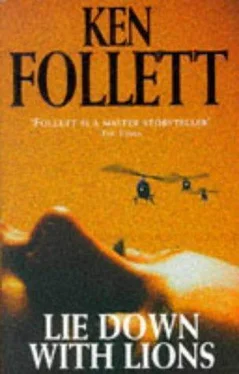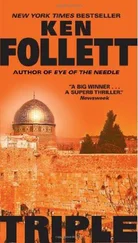Ken Follett - Lie down with lions
Здесь есть возможность читать онлайн «Ken Follett - Lie down with lions» весь текст электронной книги совершенно бесплатно (целиком полную версию без сокращений). В некоторых случаях можно слушать аудио, скачать через торрент в формате fb2 и присутствует краткое содержание. Жанр: Боевик, на английском языке. Описание произведения, (предисловие) а так же отзывы посетителей доступны на портале библиотеки ЛибКат.
- Название:Lie down with lions
- Автор:
- Жанр:
- Год:неизвестен
- ISBN:нет данных
- Рейтинг книги:4 / 5. Голосов: 1
-
Избранное:Добавить в избранное
- Отзывы:
-
Ваша оценка:
- 80
- 1
- 2
- 3
- 4
- 5
Lie down with lions: краткое содержание, описание и аннотация
Предлагаем к чтению аннотацию, описание, краткое содержание или предисловие (зависит от того, что написал сам автор книги «Lie down with lions»). Если вы не нашли необходимую информацию о книге — напишите в комментариях, мы постараемся отыскать её.
Lie down with lions — читать онлайн бесплатно полную книгу (весь текст) целиком
Ниже представлен текст книги, разбитый по страницам. Система сохранения места последней прочитанной страницы, позволяет с удобством читать онлайн бесплатно книгу «Lie down with lions», без необходимости каждый раз заново искать на чём Вы остановились. Поставьте закладку, и сможете в любой момент перейти на страницу, на которой закончили чтение.
Интервал:
Закладка:
It was hot even in the shade. He sat in the doorway of the little house, trying to catch what breeze there was. He could see the fields, the river with its arched rubble-and-mortar bridge, the village with its mosque, and the overhanging cliff. Most of the guerrillas were in their positions, which provided them with shelter from the sun as well as cover. The majority of them v/ere in houses close to the cliff, where it would be difficult for helicopters to strafe them; but inevitably some were in the more vulnerable forward positions, nearer the river. The rough stone façade of the mosque was pierced by three arched doorways, and one guerrilla sat cross-legged under each arch. They made Ellis think of guardsmen in sentry boxes. Ellis knew all three of them: there was Mohammed in the farthest arch; his brother Kahmir. with the wispy beard, in the middle; and in the nearest arch Ali Ghanim, the ugly man with the twisted spine and the family of fourteen children, the man who had been wounded with Ellis down in the plain. Each of the three had a Kalashnikov across his knees and a cigarette between his lips. Ellis wondered which of them would be alive tomorrow.
The first essay he had written in college had been about the wait before battle as handled by Shakespeare. He had contrasted two precombat speeches: the inspirational one in Henry V in which the King says: "Once more unto the breach, dear friends, once more; or close the wall up with our English dead"; and Falstaff s cynical soliloquy on honor in 1 Henry IV: "Can honour set to a leg? No. Or an arm? No. ... Honour hath no skill in surgery, then? No. ... Who hath it? He that died o' Wednesday." The nineteen-year-old Ellis had got an A for that—his first, and his last, for afterward he was too busy arguing that Shakespeare and indeed the entire English course were "irrelevant."
His reverie was interrupted by a series of shouts. He did not understand the Dari words used, but he had no need to: he knew, from the urgency of tone, that the sentries on the surrounding hillsides had spotted distant helicopters, and had signaled to Yussuf on the clifftop, who had spread the word. There was a flurry of movement throughout the sun-baked village as guerrillas manned their posts, retreated farther into their cover, checked their weapons and lit fresh cigarettes. The three men in the archways of the mosque melted into its shadowy interior. Now the village seen from the air would appear deserted, as it normally would during the hottest part of the day, when most people rested.
Ellis listened hard and heard the menacing throb of approaching helicopter rotors. His bowels felt watery: nerves. This is how the slants felt, he thought, hiding in the dripping jungle, when they heard my helicopter gunship coming toward them through the rainclouds. You reap what you sow, baby.
He loosened the safety pins in the firing device.
The helicopters roared closer, but still he could not see them. He wondered how many there were: he could not tell from the noise. He saw something out of the corner of his eye, and turned to see a guerrilla dive into the river from the far bank and begin swimming across toward him. When the figure emerged near Ellis he could see that it was scarred old Shahazai Gul, the brother of the midwife. Shahazai's specialty was mines. He dashed past Ellis and took cover in a house.
For a few moments the village was still and there was nothing but the heartstopping throb of rotor blades, and Ellis was thinking Jesus, how the hell many of them have they sent? and then the first one flashed into view over the cliff, going fast, and wheeled down toward the village. It hesitated over the bridge like a giant hummingbird.
It was an Mi-24, known in the West as a Hind (the Russians called them Hunchbacks because of the bulky twin turboshaft engines mounted on top of the passenger cabin). The gunner sat low in the nose with the pilot behind and above him, like children playing piggyback; and the windows all around the flight deck looked like the multifaceted eye of a monstrous insect. The helicopter had a three-wheeled undercarriage and short, stubby wings with underslung rocket pods.
How the hell could a few ragged tribesmen fight against machinery like that?
Five more Hinds followed in rapid succession. They overflew the village and the ground all around it, scouting, Ellis presumed, for enemy positions. This was a routine precaution—the Russians had no reason to expect heavy resistance, for they believed their attack would be a surprise.
A second type of helicopter began to appear, and Ellis recognized the Mi-8, known as the Hip. Larger than the Hind but less fearsome, it could carry twenty or thirty men, and its purpose was troop transport rather than assault. The first one hesitated over the village, then dropped suddenly sideways and came down in the barley field. It was followed by five more. A hundred and fifty men, Ellis thought. As the Hips landed, the troops jumped out and lay flat, pointing their guns toward the village but not shooting.
To take the village they had to cross the river, and to cross the river they had to take the bridge. But they did not know that. They were just being cautious: they expected the element of surprise to enable them to prevail easily.
Ellis worried that the village might appear too deserted. By now, a couple of minutes after the first helicopter appeared, there would normally be a few people visible, running away. He strained his hearing for the first shot. He was no longer scared. He was concentrating too hard on too many things to feel fear. From the back of his mind came the thought: It's always like this once it starts.
Shahazai had laid mines in the barley field, Ellis recalled. Why had none of them exploded yet? A moment later he had the answer. One of the soldiers stood up—an officer presumably—and shouted an order. Twenty or thirty men scrambled to their feet and ran toward the bridge. Suddenly there was a deafening bang, loud even over the whirlwind of helicopter noise, then another and another as the ground seemed to explode under the soldiers' running feet—Ellis thought Shahazai pepped up his mines with extra TNT—and clouds of brown earth and golden barley obscured them, all but one man who was thrown high in the air and fell slowly, turning over and over like an acrobat until he hit the ground and crumpled in a heap. As the echoes died there was another sound, a deep, stomach-thudding drumbeat that came from the clifftop as Yussuf and Abdur opened fire. The Russians retreated in disarray as the guerrillas in the village started firing their Kalash-nikovs across the river.
Surprise had given the guerrillas a tremendous initial advantage, but it would not last forever: the Russian commander would rally his troops. But before he could achieve anything he had to clear the approach to the bridge.
One of the Hips in the barley field blew apart, and Ellis realized that Yussuf and Abdur must have hit it. He was impressed: although the Dashoka had a range of a mile, and the helicopters were less than half a mile away, it took good shooting to destroy one at this distance.
The Hinds—the humpbacked gunships—were still in the air, circling above the village. Now the Russian commander brought them into action. One of them swooped low over the river and shelled Shahazai's minefield. Yussuf and Abdur fired at it but missed. Shahazai's mines exploded harmlessly, one after another. Ellis thought anxiously: I wish the mines had knocked out more of the enemy—twenty or so men out of a hundred and fifty isn't much. The Hind rose again, driven off by Yussuf; but another one descended and strafed the minefield again. Yussuf and Abdur poured a constant stream of fire at it. Suddenly it lurched, part of a wing fell off and it nosedived into the river; and Ellis thought: Nice shooting, Yussuf! But the approach to the bridge was clear, and the Russians still had more than a hundred men and ten helicopters, and Ellis realized with a chill of fear that the guerrillas could lose this battle.
Читать дальшеИнтервал:
Закладка:
Похожие книги на «Lie down with lions»
Представляем Вашему вниманию похожие книги на «Lie down with lions» списком для выбора. Мы отобрали схожую по названию и смыслу литературу в надежде предоставить читателям больше вариантов отыскать новые, интересные, ещё непрочитанные произведения.
Обсуждение, отзывы о книге «Lie down with lions» и просто собственные мнения читателей. Оставьте ваши комментарии, напишите, что Вы думаете о произведении, его смысле или главных героях. Укажите что конкретно понравилось, а что нет, и почему Вы так считаете.












